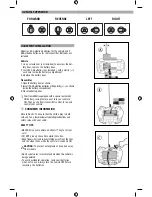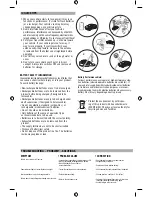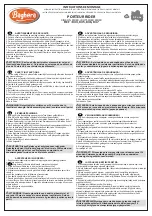
SYMPTOM
Vehicle runs slowly or will not run.
Power indicator light on transmitter does not light.
Erratic operation or only short range possible.
Vehicle doesn’t work after going through water or snow.
• PROBABLE CAUSE
• Loose battery connection or vehicle switch not ON.
• Weak or uncharged rechargeable NiCd battery.
• Weak AA batteries (Power Clip) or
transmitter battery.
• Transmitter battery weak or not connected.
• Radio interference likely.
• Water in the electronics area.
• CORRECTION
• Check battery connector and vehicle switch.
• Charge battery or replace.
• Replace with fresh alkaline battery.
• Check connections and replace battery if required.
• Change location - see Point 2, “Quick Tips.”
• Vehicle will take several hours to dry. Allow to dry
thoroughly overnight before trying again.
• Avoid driving in water or snow.
TROUBLESHOOTING - PROBLEM? - SOLUTIONS
Battery Performance Note:
For best performance use regular or high-performance alka-
line batteries (where disposable batteries are called for). If
your vehicle is supplied with standard (carbon-zinc) batteries
for initial use and/or demonstration purposes, we recom-
mend replacing them with alkaline batteries when necessary.
Battery life may vary depending on battery brand.
BATTERY SAFETY INFORMATION
In exceptional circumstances batteries may leak fluids that
can cause a chemical burn injury or ruin your product.
To avoid battery leakage:
• Non-rechargeable batteries are not to be recharged.
• Rechargeable batteries are to be removed from the
product before being charged (if designed to be
removable).
• Rechargeable batteries are only to be charged under
adult supervision (if designed to be removable).
• Do not mix alkaline, standard (carbon-zinc), or
rechargeable (nickel-cadmium) batteries.
• Do not mix old and new batteries.
• Only batteries of the same or equivalent type
as recommended are to be used.
• Batteries are to be inserted with the correct polarity.
• Exhausted batteries are to be removed from the
product.
• The supply terminals are not to be short-circuited.
• Dispose of battery(ies) safely.
• Do not dispose of this product in a fire. The batteries
inside may explode or leak.
Protect the environment by not dispos-
ing of this product with household waste
(2002/96/EC). Check your local authority for
recycling advice and facilities.
1. When your vehicle starts to lose power, it may lose
functions or performance. It's time for fresh batteries
(or a recharge). Your vehicle's running time may
change depending on your driving style.
2. Radio interference can effect your vehicle’s
performance. Interference can be caused by other R/C
vehicles running on the same frequency, electrical wires,
large buildings or CB radios. Try to stay away from these!
3. Point your transmitter antenna up - not down toward
your vehicle. If your vehicle gets too far away, it
won't work properly. If your transmitter has an
antenna carry-loop feature, make sure the antenna
is removed from the holder and straightened before
operating.
4. Don’t drive your vehicle in sand or through water or
snow.
5. Don’t store your vehicle near heat or in direct
sunlight. Always turn switches OFF and remove all
batteries for storage.
IV.QUICK TIPS
2
1
5
4
3






















